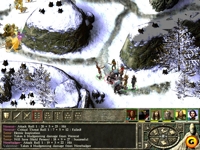Magician's Choice
Dec 8, 2004 · peterb · 4 minute readGames
[ ](/
weblog/images/articles/dale2_screen010.jpg)
](/
weblog/images/articles/dale2_screen010.jpg)
I’ve been playing a bit more Icewind Dale II recently, and I have gotten a bit further in to the game. The game is so soulless and uninteresting that it takes my breath away. Only a committee could have taken such a simple concept and turned out something so completely lacking in fun. As I plow through the same Forgotten Realms setting as the Baldur’s Gate games, using the familiar D20 rules that I enjoyed in other games, I am overcome with ennui and want to lay down and take a nap (or, more accurately, play BGII or bg1tutu instead.)
Why? If you’ve ever played a Japanese RPG – and really, with the success of Final Fantasy, who hasn’t? – then you have probably noticed the Magician’s Choice. The magician’s choice is where someone asks you to make a selection (“pick a card, any card!") but whatever you choose, you are guided to pick the card the magician wanted.
That magician’s choices happen in games is not surprising or upsetting in the least. Narratives, if you’re not reading Burroughs, are about telling a story, which necessitates starting in one place and ending in another. American games, following the pattern of Wizardry and Ultima, have traditionally been very laissez faire about forcing players to take a particular path. If the player want to wander around in random places killing monsters or exploring, he can. Arguably, that’s the point of this type of game. Bethesda’s Morrowind is the most modern example of this school of thought. Japanese games tend to be a lot stingier. The minute you defeat the boss of a given area (and of course there has to be a boss, heaven forbid there be anything original), you are either unceremoniously booted onward and upward, or simply subjected to artificial boredom until you leave.
So the question isn’t whether you’ll be given a magician’s choice. You will be. The question is how well the magician executes the force. If the magician is good, as were the authors of Planescape: Torment, you won’t notice it. If the magician is bad, as are the authors of Icewind Dale II, you can’t notice anything else.
Forcing can happen on a macro or micro level. The classic Infinity Engine games followed a pattern that worked pretty well. The player began in a very narrow area where choice was comparatively constrained, but soon found himself in an immense sandbox with an overwhelming array of choices (the city of Athkatla in BGII, the city of Sigil in Placescape: Torment). On a macro level, the magician’s choice was still in play – you’re trying to get 20,000 gold pieces, find your kidnapped friend Imoen, learn your identity, and so on – but on a micro level choices could be made which had no impact on the plot and which served no point except to add color and depth to the game. This was especially true of Torment, the best RPG of the 1990s. For me, at least, there was never a moment when I did not believe, completely, that the world I was in was bigger than my role in it, and that I would probably never discover everything about it.
Five hours into Icewind Dale II, I’m pretty sure I know everything there is to know about it. The constrained choices aren’t just on the macro level. Practically every step you take is predetermined. “I, the game designer, will force you to walk down this twenty-five foot hallway before you can walk down that twenty-five foot hallway. I will provide no explanation for this; the pile of logs in your way will just magically disappear at the appropriate time.”
This wouldn’t annoy me nearly as much if I were playing a Japanese RPG, if only because I would expect it. But using the Infinity Engine for this sort of scripting feels akin to using kobe beef to make Old El Paso Taco mix flavored tacos. It might taste OK on some level, but all you can think while experiencing it is: what a waste.